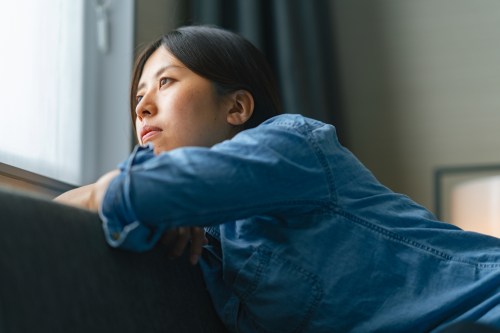This Year, I’m Resolved To Stop Expecting the Worst To Happen
Waiting for the other shoe to drop became by default in 2022, but my goal this year is to stop catastrophizing and to become more optimistic.

In the last couple of years, I’ve become somewhat of a worrywart. I believed that whatever could go wrong would go wrong, and I struggled to relish the good times because I was, to borrow from the old adage, “waiting for the other shoe to drop.”
It isn’t a very fun way to live. Presuming that disappointment is always just around the corner breeds unwanted stress and anxiety, which I suspect many of us have enough of already. I conflate what-ifs (“What if things turn out to be a total disaster?”) with hard facts (“It will be a total disaster!”). And these thoughts play through my mind like a track on repeat, but unlike the catchy tune that made it to the number one spot in my Spotify Wrapped, it carried the ominous trill that might precede a jump scare in a horror movie.
All this sticky thinking is fodder for catastrophizing, or having a tendency to assume the worst of most, if not all, situations. Even seemingly inconsequential occurances—say, a casual interaction—are contaminated with worry, and rather than focusing on the other person, I’m stressing over that one wrong thing I said and that because of it, they probably think I’m awful. Whether a situation occurred a few minutes or months ago, you can bet that I’m still ruminating about it. The problem with catastrophizing, at least for me, is that it doesn’t leave much room for positivity, optimism, or hope, all of which can help with stress management, mood, and better overall mental health.
Throughout 2022, I spent more time in my head than in my actual life, leaving my imagination to project its fears and anxieties onto the future—which, as one can expect only lead to more worry since it was filtered through a “doom and gloom” lens. These repetitive thought patterns also made me fold into myself, turning my focus inward as a means of self-preservation, and as such, I’ve missed out on opportunities to connect with my loved ones.
Ashamed as I am to admit it, I too often let weeks pass without checking in on my family and friends, and let whole conversations with my partner take place without my being there at all. What’s more, it robbed me of the “present moment,” so to speak, because I was too preoccupied bracing myself for a future that hasn’t happened yet, and it hindered my ability to experience joy because I assumed bad things would only follow suit.
All that is to say, I was left with a heightened sense of anxiety around uncertainty and a tremendous amount of loneliness, which let’s be honest, I might have brought upon myself. Thinking about the worst-possible outcomes didn’t shield me from disappointment either, let alone prepare me for it. And, after a year of much strife, disappointment was to be had to say the least.
Indeed, there is only so much that incessant catastrophizing can achieve—and why this year, I’m venturing to challenge my negative thinking patterns by resolving to stop expecting the worst-possible outcome, which might in turn, fix a long-standing apprehension for uncertainty—but, baby steps. At the very least, I’m hoping to let things unfold without jumping to conclusions.
So far, I’ve managed to keep to that promise. I’m meeting the what-ifs that wander to the front of my consciousness with skepticism rather than taking them as fully-fledged predictions. And while many of these thoughts still manage to make my stomach clench, I’m interspersing them with positive anticipation, like imagining the next reunion with my family. Perhaps, over time, I’ll eventually come around to the fact that the future can also hold the possibility of joy—and that, sometimes, there doesn’t always have to be a catch to experiencing it.
Sign Up for Our Daily Newsletter
Get all the latest in wellness, trends, food, fitness, beauty, and more delivered right to your inbox.
Got it, you've been added to our email list.








